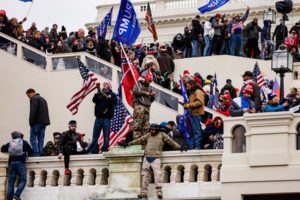By Steve Neavling
An FBI report warned of the potential for violence in response to a disputed election just over two months before the U.S. Capitol riot on Jan. 6, 2021.
The red cell report, titled “Alternative Analysis: Potential Scenarios for Reactions of Domestic Violent Extremists to a Disputed 2020 US Presidential Election,” spelled out the possibility of domestic extremists taking action if the election was contested.
“In response to a disputed election, [domestic violent extremists] are very willing to take action, but their capabilities to do so remain low, largely due to disorganization and law enforcement pressure,” stated the Oct. 27, 2020, report, obtained by NBC News.
The red cell report, which is meant to challenge conventional wisdom, added that “law enforcement preemption” and the “disorganization” of extremist groups “likely would hinder widespread violence.”
The FBI and other federal law enforcement agencies have been criticized for not taking more action ahead of the Capitol attack.
The report was prepared by the FBI’s Intelligence Council, Counterterrorism Division, and the Boston Field Office, with contributions from another unnamed FBI entity.
“The exercise concluded that [domestic violent extremists’] capabilities and willingness to take action likely would drive their reactions to a disputed election result, compounded with underlying grievances related to COVID-19 mitigation measures and racial justice tensions,” read a summary of the report. “Under this alternative analysis, law enforcement preemption and lack of coordination between [domestic violent extremists] likely would hinder widespread violence, though [domestic violent extremists’] engaging in uncoordinated acts of violence remain a threat.”
The Jan. 6 committee that investigated the attack critiqued the report but never published it. The critique concluded that the bureau failed to consider that a larger movement could unite and become a threat.
The committee said the FBI analysis had a “lone offender bias” and that the bureau “missed the forest for the trees.”






